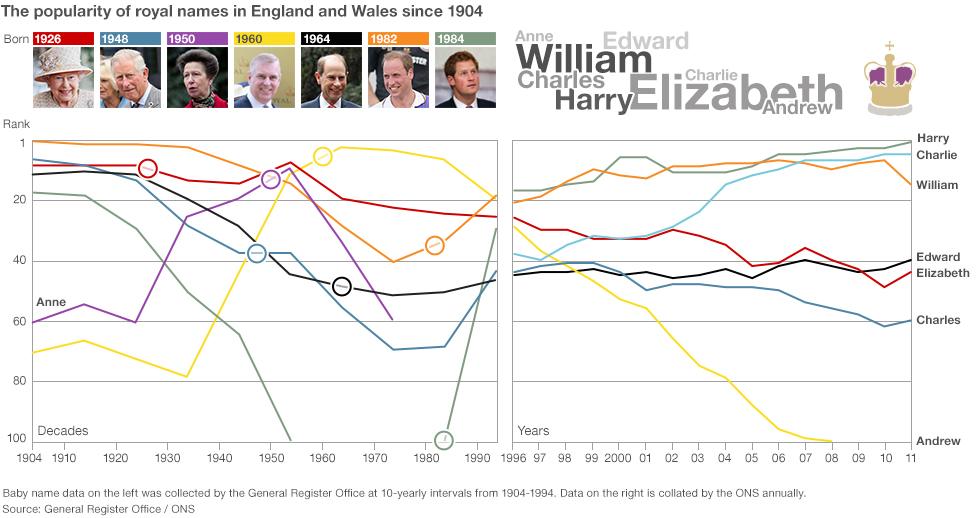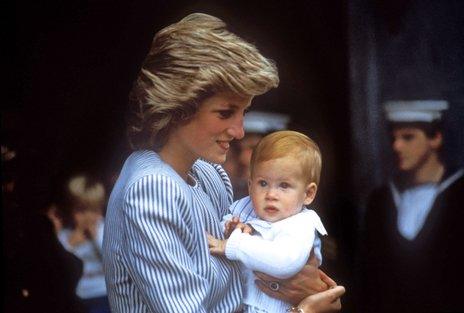Are royal baby name choices copied by the public?
- Published

One might assume that the choice of royal baby names has a massive impact on the monikers that ordinary people choose. That isn't necessarily the case.
Baby name trends are influenced by an eclectic range of sources. In 2001, the girls' name Chardonnay was nowhere in the names chart, only just creeping into the ONS's top 5000 for England and Wales.
In January 2002, Footballers Wives - with a central character named Chardonnay - started on British television. For 2002, the name hit 519 in the charts and by 2003 Chardonnay was at a respectable 372.
Royal names, especially British monarchs', are less varied. The last 11 monarchs have been Elizabeth, George, Edward, George, Edward, Victoria, William, George, George, George and George.
George was also the bookmaker's favourite for the royal family's latest addition. Tradition usually plays more of a part for those who are future monarchs, says Joe Little, managing editor of Majesty magazine.
"When it's a future royal monarch, tradition and continuity plays a big role, which is why there are lots of Georges and Williams to underline the continuity of the house of Windsor and prior to that, the royal dynasty. A name is often a tribute, or honours respected members of the family.
"With a second child, like Harry - whose first name is Henry, but it was announced he would be known as Harry - it can be more unorthodox."
George VI was of course christened Albert, at least in part to mollify Queen Victoria, but went with tradition when suddenly obliged to choose a regnal name.
There are plenty of new Georges in the UK every year.
But if you look back over the ONS figures for naming, it's hard to see any boost from the reigns of George V and George VI.
George was the third most popular boys' name in 1904 - before George V came to the throne in 1911 - and stayed at the same spot for three decades. The name slid slightly down the ranks in the 1950s, but has consistently remained in the top 20 since 1996.
Prince William's birth in 1982 doesn't appear to have had a huge impact on the number of Williams. The name already had a long history of being popular with the public - ranking number one in 1904, number two in 1914 and number three in 1934. At its least popular, the name fell to 41st position in 1974. It rose slightly to 34th in 1984 and to 19th by 1994, but it's hard to posit a causal link.
But William, like many of the other "royal" names, is sufficiently popular to make it harder to judge how much of an impact the royal choice had.
It's easier with some less common royal names.
Harry didn't make the top 100 boys names in 1964. But by 1994, 10 years after Prince Harry - christened Henry but referred to as Harry from the off - was born, it was 30th.
It was fifth in 2006 and third in 2009. In 2011, it was the most popular boys' name.
But again, Harry is part of a more general trend of parents formally registering their offspring with names that used to be regarded as diminutives. Of the top five names in 2011, four are diminutives - Harry, Jack (also regarded as a name in its own right), Alfie, Charlie.
Zara has climbed the ranks since the birth of Zara Phillips in 1981. The fullest ONS figures are only from 1996, but they show Zara steadily rising. Then the name was 142nd, in 1997 it hit 123rd and so on until it peaked at 66th in 2007.
However the names of Prince Andrew's children - Beatrice and Eugenie - haven't made much of an impression. Beatrice hasn't broken into the top 100 and the more unusual Eugenie peaked at 1622nd position in 1998.
So it's difficult to see any sort of causal relationship.

Rosie Harper, vicar of Great Missenden, Buckinghamshire, believes royal names don't hold the attraction they once had.
"Couples tend to simply chose names because they like them, rather than looking to royalty. It's the same with some biblical names, although the apostles - Matthew, Mark, Luke and John - are still popular, and sentimental family names which are often being used as a middle name, rather than a first name," she says.
Now, parents also look for different qualities in boys' and girls' names, according to Harper.
"Girls' names have got fussier and complicated double-barrelled names like Sophie-Jo and Ellie-May have become more popular, whereas boys' names tend to be simple, strong sounding names like Jacob, Noah, Toby and Theo.
"There is also a bit of a thing with old-fashioned names such as Stanley and Frederick - which we tend to think of as the grandfather generation - catching on," she says.
Looking back over any chart of British naming trends and you'll see there's been a mania for diminutives in the past two decades. Once upon a time, people would have sneered at someone being christened Jack. Jack's short for John, they would have told the naming freestyler.
But Jack was the most popular boy's name every year from 1996 to 2008.
And whereas Charles may be declining in popularity, Charlie is on the rise. It was the fifth most popular boy's name in England and Wales in 2010 and 2011.
But despite the example of Harry, most won't expect a diminutive for the latest prince.
You can follow the Magazine on Twitter, external and on Facebook, external